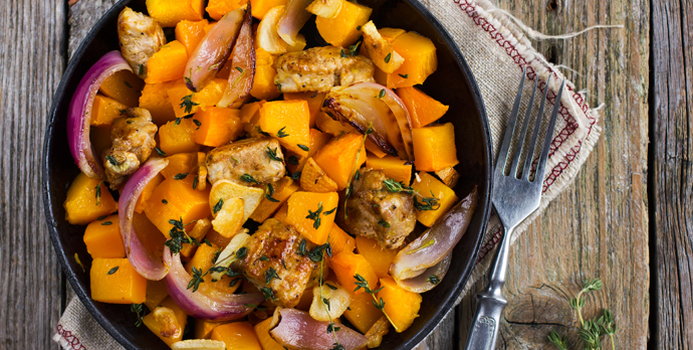Not everything delicious is bad for you, as pumpkin proves. It’s a versatile flavor that can be found in a variety of different foods, from spiced lattes to pie, but this bright orange vegetables (which is technically a fruit) doesn’t have to be baked into things to taste good. On its own, it’s nutrient-dense, low in calories, and has several health benefits.
It’s Rich in Antioxidants
According to Healthline, pumpkin contains several antioxidants, including alpha-carotene, beta-carotene, and beta-cryptoxanthin. The publication notes that antioxidants are believed to help protect your cells against the damage from free radicals.
Medical News Today reports that individuals who consume beta carotene may have a reduced risk of developing cancer, as there is a link between “tumor suppression in prostate cancer.”
A Fantastic Source of Vitamin A
Pumpkin is filled with vitamins and minerals, including the carotenoids, beta-carotene. Our bodies can convert this into Vitamin A, and just one cup of pumpkin is twice the daily recommended intake. Vitamin A can potentially strengthen your immune system and help fight infections.
Just What Your Eyes Need
In addition to Vitamin A, pumpkin is also a good source of lutein and zeaxanthin. These two compounds have been found to lower the risk of eye cataracts and age-related macular degeneration (AMD), Healthline reports.
Not Just Vitamins and Minerals, But Also Fiber
A cup of pumpkin purée has more raw fiber than quinoa. "[That's] about a quarter of what's recommended for women each day, and about a fifth of what's recommended for men," Ali Webster, associate director of nutrition communications for the International Food Information Council Foundation, told the Martha Stewart website.
Fiber-Rich Diets Can Also Help With Weight Loss
"Pumpkin keeps you feeling fuller longer," diet and nutrition expert Caroline Kaufman, told WebMD. "There's seven grams of fiber in a cup of canned pumpkin. That's more than what you'd get in two slices of whole-grain bread."
Low in Calories
We mentioned earlier that pumpkin was low in calories, and to understand this, it’s best to provide the nutritional information relating to a pumpkin. According to Medical News Today, 1 cup (or 245 grams) of cooked, boiled, or drained pumpkin (without salt) has 49 calories. It also contains 1.76 g of protein, 2.7 g of fiber, 0.17 g of fat, 12 g of carbohydrate, and 0 g of cholesterol.
Keeping the nutritional information above in mind, it’s perhaps not surprising that pumpkin could help individuals to control their blood sugar levels and diabetes (although more research is needed on humans). Medical News Today notes that in a study on mice, pumpkin polysaccharides were found to bring down their sugar levels.
On a side note, this is probably the best time of year to eat pumpkin because it’s in season from late August through December. But you do not need to eat fresh pumpkin, as Ali Webster told Martha Stewart, you can purchase a can of organic pumpkin purée which is “nutritionally equal to making homemade purée”—plus way more convenient!
[Image via Shutterstock]



